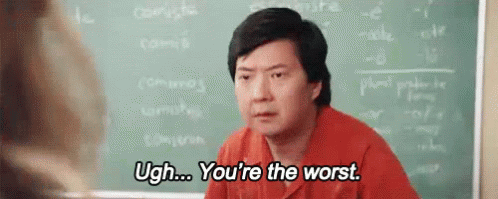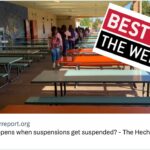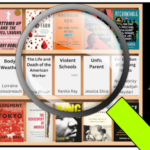All the really bad decisions, stories, coverage, and writing of this past school year.
I love reading education stories. I’d have to, right? Writing this column depends on it.
And I firmly believe that how journalists cover education issues matters greatly to teachers, parents, and policy makers.
That makes it all the more frustrating when bad education journalism gets out, as it too often does. Low-quality education journalism has the potential to do real damage.
So, as painful as this yearly exercise is, it’s important for us all to recognize the worst stories, the biggest opportunities missed, the most problematic lapses in the education journalism community.
Here, then – does anyone do drumrolls anymore? – are The Grade’s nominees for worst of the year.
There are several nominees in each category. Be sure to let us know if you see anything wrong or missing.
WORST OUTLET OF THE YEAR

SALON: Once a place for talented writers and thoughtful writing, Salon has turned into something embarrassing and regrettable in its middle age. The most obvious example was the online outlet’s role in promoting the DeVos resignation rumor. But the site, which picks up stories from AlterNet and other unreliable sources, isn’t worth reading these days.
THE 74: There are lots of talented folks there. The storytelling is often creative and appealing. The code of ethics is an improvement. Some of the outlet’s work probably should have been an EWA award finalist. But the story assignment and coverage are still too predictably pro-reform. The 74’s editorial leadership seems to believe that reporting on school reform efforts and keeping reform efforts accountable are mutually exclusive. The 74 could do both, I think, and win enormous credibility in the process. But that’s not happening here yet.
CHALKBEAT NATIONAL: The idea of Chalkbeat USA is a great one. But the execution is poor. The writing is wonky and predictable rather than compelling or insightful. Sometimes the national pieces go too far trying to sell a story that’s actually more nuanced than is presented. The newsletter – a helpful roundup of local stories with national appeal – is the only reliably redeeming aspect I can find. But that’s not really enough. Maybe a second reporter will help? I sure hope so. I really want to like it.
Related coverage: Chalkbeat adds a new focus on storytelling to its ongoing expansion
WORST COVERAGE OF THE YEAR

COVERING THE D.C. PUBLIC SCHOOLS: Until very recently, media coverage of D.C. public schools has been weak and credulous. The predictable result was that City Hall, DCPS leaders, and building-level educators were able to do all sorts of things — fudge attendance records, change grades, inflate graduation rates, and claim to be a standout success — without being detected. The Washington Post is the obvious culprit here, having treated the D.C. schools beat like an afterthought for several years. But national outlets in D.C. like the New York Times, Associated Press, or NPR could have figured this out and done something if they’d wanted.
Related coverage: How the Washington Post missed the D.C. schools graduation rate scandal so badly, for so long
COUNTING SCHOOL SHOOTINGS: The most egregious problem with this year’s school shooting coverage has been the tendency to exaggerate the number of school shootings that have taken place. No one wants to minimize the problem. But over and over, mainstream news outlets have failed to put school shootings into context, making them appear much more common than they are. There have been stories and statistics that have been too good to check, but the hyped school shooting numbers have been the biggest error category of the year. Just last week, Snopes investigated the Washington Post’s claim that more kids have died in school shootings than in the military. The Post corrected its story.
Related coverage: Misleading coverage of school shootings in 2018
ACCOUNTABILITY IN PARKLAND: Three months after the tragedy in Florida, initial national and local coverage of the Parkland school shooting (like this early Washington Post story that seems like an attempt to exonerate the school and district officials) is proving to have been enormously sloppy and in ways misleading. Despite massive coverage, it took more than two months after the shooting for anyone to report that Broward schools were stonewalling reporters and investigators or that there were problems with the school’s highly touted school discipline reform efforts, including PROMISE. School systems and administrators shouldn’t be treated with kid gloves in the aftermath of a shooting incident, as was the case for much too long here. As this case shows, they warrant as much scrutiny as anyone else.
Related coverage: The problem with Parkland
TEACHER WALKOUT COVERAGE: A close look at the coverage of the Oklahoma teacher walkout by The Grade revealed that national reporters were pigeonholing events into a national political narrative that may not have been appropriate. National outlets were also downplaying the role of teachers of color who helped lead the insurgency and school workers like bus drivers and office staff who played an enormous role in helping the movement grow. Too often this spring, coverage of the teacher walkouts has been overenthusiastic, speculative, and short on the depth and nuance required of such a major story.
Related coverage: Oklahoma teacher walkout coverage marred by an exaggerated focus on partisan politics
Related: The Grade’s favorite education bylines, teams, and outlets for Spring 2018
Related: Best Education Journalism of 2017
WORST EDUCATION REPORTER OF THE YEAR

Valerie Strauss (Washington Post): The education blogger has been on this list before and she’ll likely be there again. But it bears repeating: What she’s doing — stealing bylines that should rightly go to her contributors, essentially — is simply wrong to me, even if her contributors give her permission to post their work. Her page is also lazy. Instead of helping readers sort through complicated issues or giving us an unsparing analysis of both sides, she’s pandering to her readers’ baser urges. She’s reform critic Diane Ravitch – but Strauss has been given the Washington Post as a platform and there’s no real counterpoint being provided to readers.
Related coverage: The Washington Post’s Confusing/Unfair “Answer Sheet” Byline System
Matt Barnum: The national education reporter for Chalkbeat seems like a really nice guy and is admired by many colleagues and readers. (He and fellow Chalkbeat reporters Dylan Peers McCoy and Laura Kebede recently won an EWA award for their series on the “portfolio” model.) But as longtime readers of The Grade already know, I’m not buying what Barnum is doing — not in its current form, at least. I find his work to be chronically misleading. I think he’s failed to be broad or balanced in what he covers. And his writing is often dense and unappealing — the opposite of what Chalkbeat leaders say they’re trying to do in terms of engaging readers and improved storytelling.
Related coverage: Chalkbeat adds a new focus on storytelling to its ongoing expansion
John Merrow: This is a tough one to write, given how supportive the veteran journalist been toward me over the years, but it has to be said. Merrow, the longtime PBS NewsHour education correspondent who brought seriousness and some degree of prestige to education reporting, is slowly but surely shedding some of the credibility he accumulated over the decades. Either that or someone has stolen his email account and is ghostwriting his newsletter. Sure, he’s retired now — a former journalist, he describes himself. His work is self-published. But it’s still hard to watch him go over the top (comparing Eva Moskowitz to Benito Mussolini, for example) in his current radicalized role when I’d rather he play the wise elder journalist.
Alexander Russo: Another repeat nominee from last year, Russo is — again — simply the worst. He critiques programs that he benefits from. He praises outlets one day, then criticizes them the next. He puts journalists through the uncomfortable experience of being interviewed and quoted. He asks them to reflect on their reporting process and respond to criticisms of their work. Nobody knows how he got that EWA award. Vote for Russo as the worst. You certainly won’t be alone.
Very sorry I wasted my time on this feature about the “worst,” education journalism: https://t.co/zQHLO4yw7T: More ed coverage needed!
— Liz Willen (@L_willen) July 25, 2017
WORST NEWSROOM DECISION OF THE YEAR
OVERCOVERING TRUMP’S “ARMED TEACHER” IDEA: The media’s relentless coverage of this desperate NRA/Trump ploy has been one of the biggest wastes of time and most embarrassing things to watch all year. That Trump and others were floating the idea should have been reported, sure. But the idea itself didn’t warrant all the credulous/horrified coverage that it received. Three months after Parkland, few states have enacted armed teacher laws or programs. Now it turns out that — whoops! — insurers won’t go along with the idea. What a waste of time.
Related coverage: Why the NRA wants you to talk about giving teachers guns (Vox)
GOING SILENT DURING THE DEVOS RESIGNATION RUMOR: National and trade media outlets that stood by passively as the DeVos resignation rumor went viral missed an opportunity to win readers and abdicated their fact-checking responsibilities What else have too many media outlets ignored lately? Good news about shrinking racial achievement gaps and child poverty rates come to mind. But this was the worst, most obvious example.
Related coverage: How the DeVos resignation rumor went viral – and what to do next time
EWA’S BROKEN AWARDS PROCESS: Though there were fewer embarrassments than last year, the EWA awards nomination process still regularly excludes some of the best education journalism of the year. Limiting consideration to self-nominated stories is a mystifying, obviously problematic practice. Admirable as it may be, relying on outreach to reporters who’ve written strong pieces seems like a heavy lift for EWA to pull off each year. And if you look at the winners announced at #EWA18, which was explicitly focused on diversity issues, the current process also seems to recognize too few journalists of color.
Related coverage: The EWA awards process is broken. Here’s how to fix it.
OVERWHELMINGLY WHITE NEWSROOMS: It’s 2018. More than half of US schoolchildren are kids of color. And yet there are still a handful of education outlets and newsrooms like The 74, the Hechinger Report, and WBEZ Chicago where — despite recent progress — the percentage of education reporters and editors is 21 percent or less. Even worse, outlets such as the New York Times, the Washington Post, and Associated Press still won’t provide demographic information about their education journalists. Racial diversity is just a start. But it’s a big part of moving forward.
Related coverage: Despite progress, racial diversity remains a big challenge for education newsrooms
This is a list you don’t want to be on. Especially those who are repeat nominees. But nobody died from being included in last year’s version. And I like to think that whatever sting there might have been was worth it.
So, if you find yourself mentioned here, take a minute to figure out whether you belong. If you do, try to do better next time. That’s all we can ask. That’s all you can do.
And even if you’re not on this list, you’re not off the hook. There are lots of other things going on in education journalism that need attention.
Perhaps the largest concern is that, by and large, too much education journalism is hard to read for anyone whose job isn’t in education or journalism. The jargon is hard to beat back into its corner. The storytelling required to get everyday readers to engage with difficult, seemingly intractable topics — what Ira Glass referred to in a recent speech as “cunning” — just isn’t there yet.
There’s lots of work to be done for all of us.
Related columns:
Worst education journalism of the year (2016-2017)
ABOUT THE AUTHOR

Alexander Russo
Alexander Russo is founder and editor of The Grade, an award-winning effort to help improve media coverage of education issues. He’s also a Spencer Education Journalism Fellowship winner and a book author. You can reach him at @alexanderrusso.
Visit their website at: https://the-grade.org/














